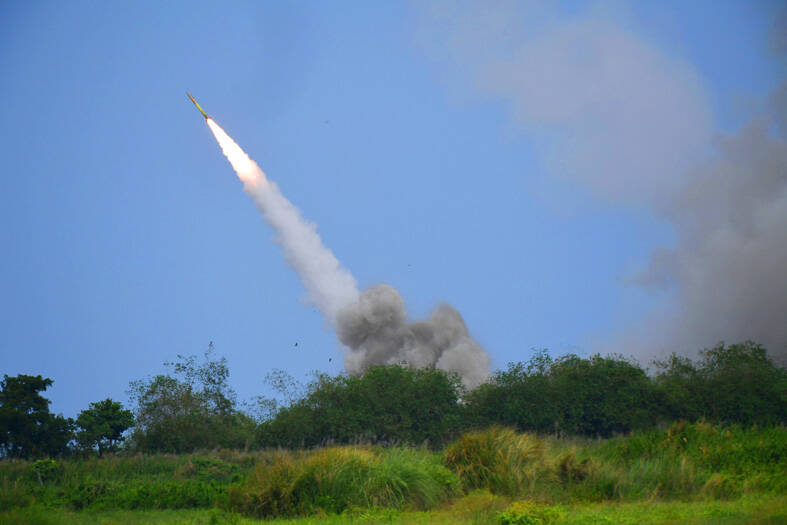Twenty-nine sets of M142 High Mobility Artillery Rocket Systems (HIMARS) that the military purchased from the US in 2020 and 2022 are to be delivered in different batches between the end of this year and 2026, based on the military’s plan.
International demand for HIMARS has been high after it has helped Ukraine hit long-range targets with precision in its war with Russia. Before the Russian invasion of Ukraine, the US government had agreed to sell 11 sets of HIMARS to Taiwan after it was confirmed that M109A6 howitzer artillery weapons would not be available to procure
The military later purchased 18 more sets of HIMARS.

Photo: AFP
The second procurement package, which cost approximately NT$32.5 billion (US$1 billion), also includes 84 MGM-140 army tactical missiles and 864 rockets.
Based on the military’s plan, the first order of 11 sets of HIMARS is to be delivered between the end of this year and next year, while the remaining sets would be delivered before the end of 2026.
The US Defense Security Cooperation Agency (DSCA) on Friday last week said that the US Department of State had approved the sale of 16 sets of HIMARS to Norway. The arms sales package, which topped US$580 million, also included 15 sets of M30A2 multiple rocket pods, 15 sets of M31A2 multiple rocket pods and 100 MGM-140 pods, as well as logistics, training and technical support.
Both M30A2 and M31A2 rockets are guided by GPS, making them more accurate in hitting their targets than traditional rockets.
Their maximum shooting range is about 92km.
The M30A2 rocket is designed with submunitions, while the M31A2 rocket is equipped with a single high-explosive warhead. The MGM-140 missiles purchased by Norway not only have a range of up to 300km, but also have a very high accuracy, with a circular arithmetic error of only 9m.
The Norwegian government had earlier this year announced that it would increase its defense spending to 600 billion kroner (US$55.7 billion) over the next 12 years, adding that its defense budget would reach 1.624 trillion kroner by 2036.
The arms package “will support the foreign policy goals and national security objectives of the US by improving the security of a NATO ally that is an important force for political stability and economic progress in Europe,” the DSCA said.
“The proposed sale will improve Norway’s capability to meet current and future threats and enhance its interoperability with US and other allied forces. It will also enhance Norway’s artillery and mid-range fire capability,” the agency said, adding that it would not alter the military balance in the region.

Intelligence agents have recorded 510,000 instances of “controversial information” being spread online by the Chinese Communist Party (CCP) so far this year, the National Security Bureau (NSB) said in a report yesterday, as it warned of artificial intelligence (AI) being employed to generate destabilizing misinformation. The bureau submitted a written report to the Legislative Yuan in preparation for National Security Bureau Director-General Tsai Ming-yen’s (蔡明彥) appearance before the Foreign Affairs and National Defense Committee today. The CCP has been using cognitive warfare to divide Taiwanese society by commenting on controversial issues such as Taiwan Semiconductor Manufacturing Co’s (TSMC, 台積電) investments in the

INVESTIGATION: The case is the latest instance of a DPP figure being implicated in an espionage network accused of allegedly leaking information to Chinese intelligence Democratic Progressive Party (DPP) member Ho Jen-chieh (何仁傑) was detained and held incommunicado yesterday on suspicion of spying for China during his tenure as assistant to then-minister of foreign affairs Joseph Wu (吳釗燮). The Taipei District Prosecutors’ Office said Ho was implicated during its investigation into alleged spying activities by former Presidential Office consultant Wu Shang-yu (吳尚雨). Prosecutors said there is reason to believe Ho breached the National Security Act (國家安全法) by leaking classified Ministry of Foreign Affairs information to Chinese intelligence. Following interrogation, prosecutors petitioned the Taipei District Court to detain Ho, citing concerns over potential collusion or tampering of evidence. The

‘COMPREHENSIVE PLAN’: Lin Chia-lung said that the government was ready to talk about a variety of issues, including investment in and purchases from the US The National Stabilization Fund (NSF) yesterday announced that it would step in to staunch stock market losses for the ninth time in the nation’s history. An NSF board meeting, originally scheduled for Monday next week, was moved to yesterday after stocks plummeted in the wake of US President Donald Trump’s announcement of 32 percent tariffs on Taiwan on Wednesday last week. Board members voted to support the stock market with the NT$500 billion (US$15.15 billion) fund, with injections of funds to begin as soon as today. The NSF in 2000 injected NT$120 billion to stabilize stocks, the most ever. The lowest amount it

NEGOTIATIONS: Taiwan has good relations with Washington and the outlook for the negotiations looks promising, Minister of Economic Affairs J.W. Kuo said Taiwan’s GDP growth this year is expected to decrease by 0.43 to 1.61 percentage points due to the effects of US tariffs, National Development Council (NDC) Minister Paul Liu (劉鏡清) said at a meeting of the legislature’s Economics Committee in Taipei yesterday, citing a preliminary estimate by a private research institution. Taiwan’s economy would be significantly affected by the 32 percent “reciprocal” tariffs slapped by the US, which took effect yesterday, Liu said, adding that GDP growth could fall below 3 percent and potentially even dip below 2 percent to 1.53 percent this year. The council has commissioned another institution